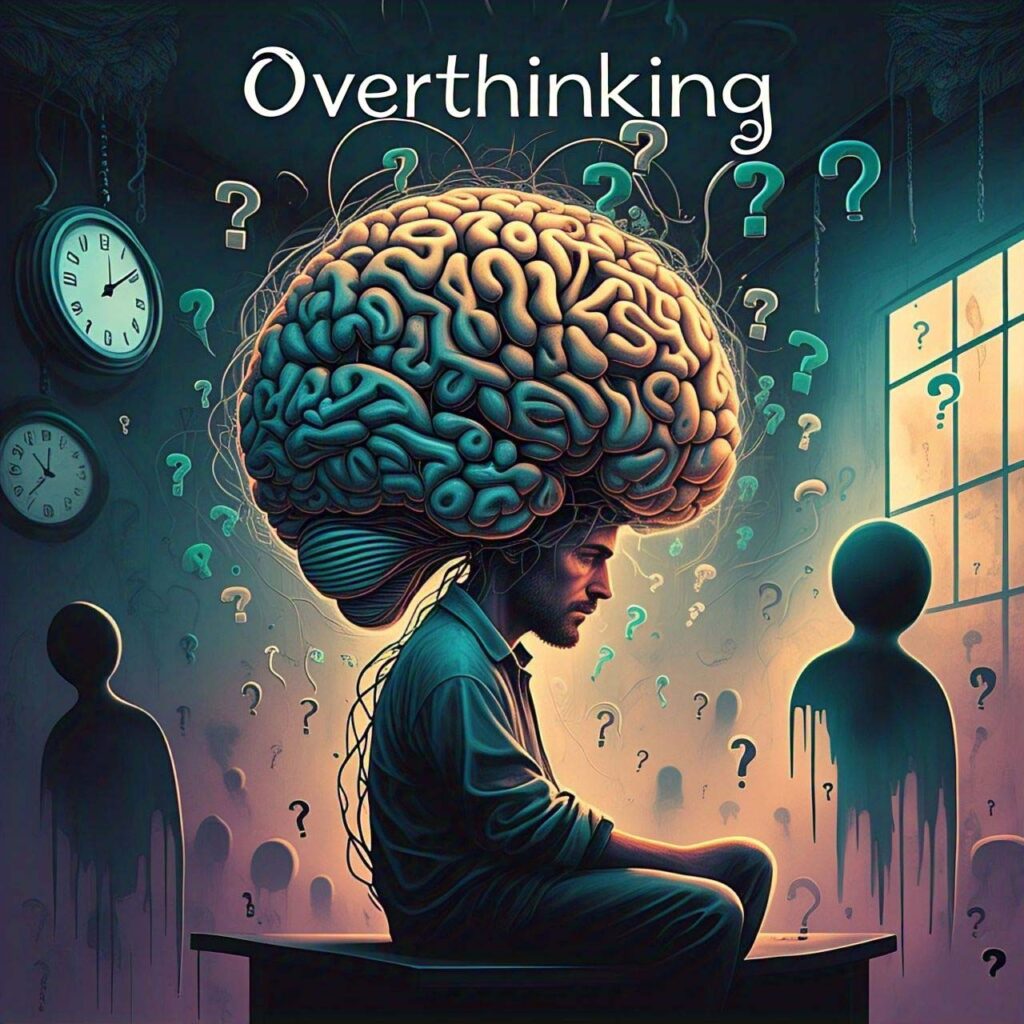Overthinking is a silent destroyer of peace. Whether it’s replaying past conversations or worrying about the future, many people find themselves trapped in the endless loop of their own thoughts. If you’re someone who tends to overthink, you’re not alone. But the good news is you can break free. In this blog, we’ll explore why you always overthink, the science behind it, and practical steps to stop overthinking.
What Does It Mean to Overthink?
Definition of Overthinking
To overthink means to dwell excessively on one’s thoughts. It often involves going over the same situation repeatedly, imagining worst-case scenarios, and struggling to make decisions. Overthinkers tend to fixate on what-ifs and find themselves caught in mental loops that offer no productive outcome.
Symptoms of Overthinking
- Difficulty making decisions
- Excessive worrying
- Constantly analyzing the past
- Fear of future outcomes
- Trouble sleeping due to racing thoughts
- Replaying conversations in your mind
Why You Always Overthink: The Root Causes
Psychological Factors
One of the main reasons people overthink is due to underlying psychological conditions like anxiety and depression. According to the World Health Organization (WHO), over 264 million people globally suffer from anxiety disorders, many of whom report excessive overthinking as a primary symptom.
Fear of Failure
People often overthink because they are afraid to fail. This fear makes them second-guess every decision and outcome, resulting in analysis paralysis. Even small choices like picking a restaurant or writing an email can become stressful when viewed through the lens of perfection.
Perfectionism
Perfectionists tend to overthink because they want to ensure every action they take is flawless. This mindset can lead to procrastination, stress, and dissatisfaction even with great results. Their inner critic never rests, always pointing out what could have been done better.
Low Self-Esteem
Those with low self-worth often question their abilities and decisions, leading to a cycle of overthinking. When you don’t trust yourself, every decision feels like a potential mistake. This not only leads to mental fatigue but also prevents personal growth.
Case Studies: Real Examples of Overthinking
Sarah, The Corporate Overthinker
Sarah is a 30-year-old marketing manager who often replays work meetings in her head, worrying she said the wrong thing. Her overthinking led to sleepless nights and chronic stress. After consulting a therapist, she learned cognitive behavioral techniques to challenge her negative thoughts. With consistent practice, Sarah began to recognize her triggers and retrain her brain.
Ahmed, The Student
Ahmed, a university student, found himself overthinking every answer on his exams. He feared making a mistake, which impacted his performance. By learning mindfulness practices, Ahmed managed to stay present during exams and significantly improved his grades. He now meditates for 10 minutes daily and uses journaling to track his emotional state.
The Science Behind Overthinking
Brain Chemistry and Overthinking
Neuroscience explains that overthinking is linked to increased activity in the prefrontal cortex, the brain’s decision-making area. When this area is overstimulated, it becomes harder to stop thinking and relax. This hyperactivity can be triggered by stress, hormonal imbalances, or unresolved trauma.
WHO Research on Mental Health
According to WHO, mental health conditions like anxiety and depression are among the leading causes of overthinking. Their 2022 report on global mental health emphasized the need for early interventions and cognitive training to manage excessive thinking patterns. Interventions such as talk therapy, structured routines, and mindfulness have shown to significantly reduce rumination.

How Overthinking Affects Your Life
Emotional Effects
- Chronic stress
- Low self-esteem
- Increased anxiety and depression
- Feeling overwhelmed
- Irritability
Physical Effects
- Fatigue
- Insomnia
- Headaches
- Digestive problems due to stress
Relationship Effects
- Miscommunication
- Emotional distance
- Overanalyzing texts or conversations
- Trust issues due to assumption-making
How to Stop Overthinking: Actionable Strategies
Practice Mindfulness
Mindfulness encourages you to stay in the present moment. Simple activities like meditation, deep breathing, or yoga can reduce overthinking. Studies have shown that even 10 minutes of mindfulness practice daily can improve attention and reduce mental clutter.
Set Time Limits for Decisions
If you give yourself a time limit to make decisions, you reduce the chances of falling into analysis paralysis. For example, give yourself five minutes to choose what to wear or 30 minutes to write an email. Timed decisions increase confidence and reduce self-doubt.
Cognitive Behavioral Techniques
CBT helps individuals identify negative thinking patterns and replace them with rational thoughts. Therapists often recommend journaling or thought-record sheets. Writing things down makes it easier to see patterns and challenge irrational beliefs.
Talk to Someone
Talking to a friend, coach, or therapist can offer a new perspective and reduce mental clutter. Verbalizing your thoughts often helps you realize which concerns are valid and which are exaggerated.
Engage in Productive Distraction
Activities like exercise, reading, painting, or learning a new skill can shift your focus and stop you from overthinking. Movement and creativity can act as healthy outlets for mental energy.

Long-Term Solutions
Build Self-Confidence
The more confident you are in your decisions, the less likely you are to overthink. Setting small, achievable goals and following through on them can significantly boost your self-esteem over time. Celebrate your wins, however small they may be.
Accept Imperfection
Learning to accept that not everything will go as planned can free you from the chains of overthinking. Letting go of the need to control every outcome opens the door to growth and peace of mind.
FAQs About Overthinking
Frequently Asked Questions
Q1: Is overthinking a mental disorder? Overthinking itself is not a disorder, but it can be a symptom of mental health conditions like anxiety, OCD, or depression. It becomes problematic when it interferes with daily functioning.
Q2: Can overthinking be cured permanently? Overthinking may never completely disappear, but it can be managed very effectively with the right techniques. Consistency in applying strategies like CBT, mindfulness, and journaling can lead to long-term improvements.
Q3: How do I know if I overthink too much? You might be overthinking if:
- You constantly second-guess your decisions
- You replay conversations or situations in your head for hours
- You struggle with sleep due to excessive thoughts
- You find it hard to focus because your mind keeps drifting
Q4: Can overthinking affect my physical health? Yes, chronic overthinking can lead to physical issues such as:
- Fatigue from lack of sleep
- Headaches
- Digestive issues
- Weakened immune response due to chronic stress
Q5: What are some quick ways to stop overthinking in the moment? Try these techniques:
- Deep breathing exercises
- Grounding techniques (e.g., the 5-4-3-2-1 sensory method)
- Physical activity like walking or stretching
- Writing your thoughts in a notebook to get them out of your head
Q6: Should I seek professional help for overthinking? Yes, especially if overthinking affects your work, relationships, or quality of life. Cognitive-behavioral therapy, counseling, and sometimes medication can provide significant relief.
Q7: Can overthinking be a positive trait? In moderation, critical thinking can be beneficial. However, when it crosses into chronic overthinking, it becomes a hindrance rather than a strength. The key is to know when to pause and act.
Conclusion:
Overthinking doesn’t have to control your life. With understanding, support, and the right tools, you can reclaim your mental peace. Start by identifying your triggers, take small steps, and seek professional help if needed. The journey to a quieter, calmer mind begins with one decision choosing not to overthink.





